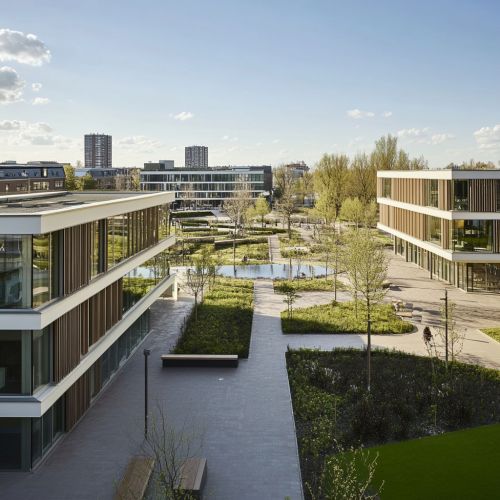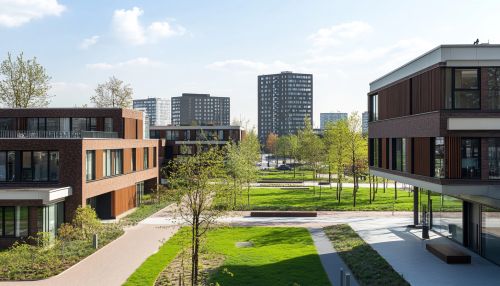Erasmus School of Economics
History and Background
The Erasmus School of Economics (ESE) is a prominent institution for higher education in economics, located in Rotterdam, Netherlands. Established in 1913, it has a long-standing tradition of excellence in economic education and research. The school is part of the Erasmus University Rotterdam, which is named after the renowned humanist and theologian Desiderius Erasmus. The institution was initially founded as the Netherlands School of Commerce, reflecting the country's burgeoning trade and commerce sectors at the time. Over the years, it evolved into a full-fledged university, with the economics faculty becoming one of its most distinguished components.
Academic Programs
ESE offers a wide range of academic programs, including undergraduate, master's, and doctoral degrees. The undergraduate programs focus on providing a solid foundation in economic theory, quantitative methods, and applied economics. The master's programs are designed to offer specialized knowledge in various fields such as financial economics, behavioral economics, and econometrics. The doctoral program is research-intensive, aimed at producing scholars capable of contributing to the advancement of economic science.
Undergraduate Programs
The undergraduate curriculum at ESE is rigorous, combining core courses in microeconomics, macroeconomics, and econometrics with electives that allow students to tailor their studies to their interests. The Bachelor of Science in Economics and Business Economics is the flagship undergraduate program, attracting students from around the globe.
Master's Programs
ESE's master's programs are highly regarded for their depth and specialization. Notable programs include the Master in Financial Economics, which focuses on the functioning of financial markets and institutions, and the Master in Behavioral Economics, which explores the psychological underpinnings of economic decision-making. The Master in Econometrics is particularly esteemed for its emphasis on quantitative analysis and statistical modeling.
Doctoral Programs
The doctoral program at ESE is designed for students aiming to pursue academic or high-level research careers. It involves intensive coursework in advanced economic theory and econometrics, followed by original research leading to a dissertation. Doctoral candidates are encouraged to publish their findings in leading academic journals and present at international conferences.
Research and Faculty
ESE is renowned for its research output, particularly in the fields of econometrics, behavioral economics, and finance. The faculty comprises distinguished scholars who are leaders in their respective fields. Research at ESE is organized around several key themes, including market behavior, policy evaluation, and economic development.
Research Centers
ESE hosts several research centers that facilitate collaborative projects and foster innovation. The Tinbergen Institute, named after Nobel laureate Jan Tinbergen, is a leading research institute in economics and econometrics. It offers a joint graduate program with other Dutch universities and serves as a hub for cutting-edge research.
Faculty Achievements
The faculty at ESE has made significant contributions to economic science. Many professors have received prestigious awards and grants, and their work is frequently cited in academic literature. The school's commitment to research excellence is reflected in its strong publication record and its faculty's involvement in international research networks.
International Collaboration
ESE maintains a strong international presence through partnerships with leading universities and research institutions worldwide. These collaborations enhance the school's academic programs and provide students and faculty with opportunities for exchange and joint research projects.
Exchange Programs
ESE offers exchange programs with numerous universities, allowing students to gain international experience and broaden their academic horizons. These programs are integral to the school's commitment to fostering a global perspective in economic education.
Joint Research Initiatives
The school actively participates in joint research initiatives with international partners. These collaborations often result in groundbreaking research that addresses global economic challenges, such as financial stability, climate change, and inequality.
Campus and Facilities
The ESE campus is located in the heart of Rotterdam, providing students with access to a vibrant city known for its innovation and diversity. The campus features state-of-the-art facilities, including modern lecture halls, computer labs, and a comprehensive library.
Library and Resources
The university library is a critical resource for students and faculty, offering an extensive collection of books, journals, and digital resources. The library's specialized collections in economics and business are particularly valuable for research and study.
Student Life and Activities
ESE provides a dynamic student life, with numerous clubs and organizations catering to a wide range of interests. These include academic societies, cultural groups, and sports clubs, all contributing to a well-rounded university experience.


Alumni and Impact
ESE boasts a network of successful alumni who have made significant contributions to academia, industry, and public policy. The school's graduates are known for their analytical skills and ability to tackle complex economic issues.
Notable Alumni
Many ESE alumni have achieved prominence in various fields. They include influential economists, business leaders, and policymakers who have shaped economic thought and practice globally.
Contributions to Policy and Industry
ESE's impact extends beyond academia, with faculty and alumni actively involved in shaping economic policy and industry practices. Their expertise is frequently sought by governments, international organizations, and private enterprises.
